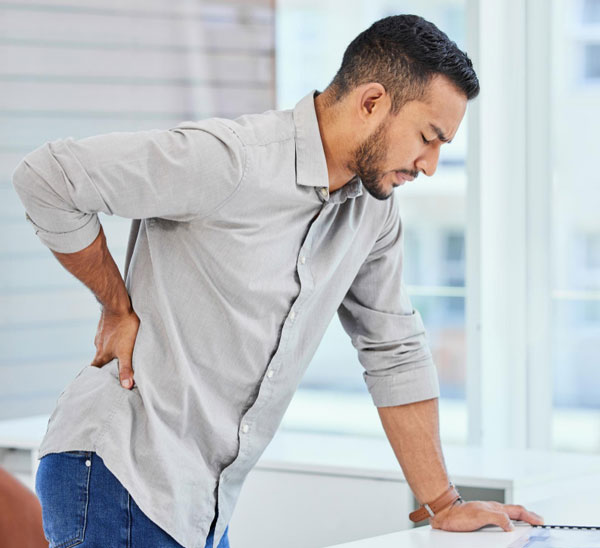Slip Disc Pain Overview
The human spine consists of vertebrae separated by intervertebral discs that act as shock absorbers. Each disc has a soft gelatinous core called nucleus pulposus, surrounded by a wall of rigid fibrous material called annulus fibrosus. When an annulus is weak or tears, the nucleus displaces outward, causing an intervertebral slip or disc herniation.
A slipped disc can occur anywhere in the spinal column. Still, it is most frequently found in the lumbar region (lower back), where it bears the maximum load. It can also occur in the cervical spine (neck). Some experience mild pain, while others develop debilitating symptoms that may radiate into the arms or legs.
Causes of a Slipped Disc
There can be multiple mechanisms for developing a slipped disc:-
- Age-Related Degeneration – Discs lose water, become less flexible, and are more prone to tears.
- Injury or Trauma – Discs may be injured in sudden impact, falls, or accidents
- Repetitive Strain – Repeatedly bending, lifting, or twisting may increase risks.
- Poor Posture – Sitting or standing awkwardly adds unnecessary spinal column stress.
- Sedentary Lifestyle – Lack of core strength weakens the support to the spine.
- Obesity – Extra body weight puts extra pressure on lumbar discs.
- Genetic Predisposition – Some people inherit the weak structure of discs.
- Smoking – It starves nutrition to the disc and speeds its degeneration.
Symptoms of Slipped Disc Pain
Symptoms are dependent on the affected disc, its location, and whether the disc puts pressure on a nerve:-
- Back pain in the lower back area, with increased pain while moving
- Pain shooting down the leg (sciatica) due to compressed nerve roots
- Tingling or numbness involving the leg or foot on the affected side
- Weakness of the muscles supplied by the compressed nerve
- Pain across the neck and shoulder if the herniation is in the cervical region
- Difficulties with standing or walking due to irritation of the nerve
- In more severe conditions, loss of bladder and/or bowel control, which should be treated as an emergency.
Diagnosis
It is essential to ensure an accurate diagnosis for successful management. Dr Ekta's Pain Management Clinic specialists utilize:-
- Clinical Examination – Looking at movement, reflexes, and nerve involvement.
- MRI or CT scan – To identify herniation, nerve involvement, and severity.
- X-ray – It is essential to rule out the presence of any fractures or misalignment.
- Nerve conduction studies – In selected cases, the function of the nerve is assessed.
Why We Are Different

No
Surgery

30-Minute Procedure

Targets Root Cause

Minimal Downtime

Long-Lasting Results

Proven, Safe Methods
Treatment Options for Slipped Disc at Dr Ekta's Pain Management Clinic
Our clinic's non-surgical approach to treating pain emphasizes achieving pain relief without resorting to surgery.
Medication Therapy
- NSAIDs for inflammation and pain reduction
- Neuropathic medications for nerve dysfunction symptoms
- Muscle relaxants to ease muscle spasms
- Use of corticosteroids on a short-term basis in selected cases
Exercises and Rehabilitation
- Individualized exercise program for the strengthening of the back and core muscles
- Postural correction methods
- Soft stretching exercises for relieving nerve compression
- Hydrotherapy and assisted mobility exercises.
Interventional Pain Management
- Epidural steroid injection (ESI) decreases inflammation around the spinal nerve roots.
- Transformational injection: This method identifies the nerve causing the pain. A small volume of anesthetic is injected directly for quick relief.
- Nerve blocks: They interrupt transmission temporarily.
- Radiofrequency ablation (RFA) provides long-term relief by interrupting the nerve that carries pain.
- Regenerative medicine (PRP therapy): The therapeutic effect is obtained using the patient's blood growth factors.
Lifestyle Modification and Ergonomics
- Weight management to lessen strain
- Ergonomic seats and supportive mattresses
- Instruction in safe lifting techniques
- Giving up smoking to slow down disc degeneration
Do It Yourself & Prevention
- Maintain correct posture when sitting, standing, or lifting.
- Stay active and do core-strengthening exercises.
- Don't carry heavy loads or engage in twisting movements.
- Use lumbar support cushions if you must sit for long hours.
- Keep taking breaks when sitting for long periods.
- Sleeping on a cozy mattress helps to maintain proper spinal alignment.
Slip Disc Pain-FAQs.
Can a slipped disc self-heal?
Most bad cases can be recovered through rest, physiotherapy, and medication. On the other hand, chronic or severe symptoms often call for interventional treatments.
Does everybody with a slipped disc require surgery to remedy their condition?
No. Most patients present with discectomy without surgery to manage them through non-surgical management: injections, RFA, and physiotherapy. There are a few patients who go to surgery because of very severe nerve compression.
What is recovery period?
Recovery is variable. Most really mild cases require improvement between 6 and 8 weeks. Still, chronic cases may take many months of treatment and lifestyle modifications to recover fully.
Does exercise aggravate a slipped disc?
Improper exercise may aggravate the pain; guided physiotherapy will ensure movements are safe so recovery occurs without risk of harm.
Is the slipped disc preventable?
It's impossible, but maintaining a healthy weight, exercising often, and not having poor posture significantly reduces the chances.
Why Dr Ekta's Pain Management Clinic?
For those in need of slipped disc pain management, these include:-
- Pain Experts for specialized treatment in handling non-surgical management of pain.
- The Advanced Interventions with Epidural Injectables, Nerve Blocks, and Regenerative Medicine.
- Holistic Care includes medical management, physiotherapy, and lifestyle correction.
- A Patient-Centered Approach refers to the comfort and personalized care for patients.
- They are also Minimally Invasive Techniques, which require fewer recovery times and risks than surgery.
At Dr Ekta's Pain Management Clinic, this is what we intend to bring back to normal again-mobility, decreased pain, and a life not limited by slipped disc conditions- all without undergoing unnecessary surgeries.
Why Choose Us
We’re the most trusted Pain Specialists in West Delhi.
Our expert clinical approach and treatment framework extends beyond just ordinary pain-relief practices to precise and targeted comprehensive pain treatment and management that ensures faster recovery and quicker return to an active life.
With robust expertise in advanced non-surgical Slip Disc Pain Treatment in West Delhi, our Pain Specialists at Dr Ekta’s Pain Management Clinic, strives to ensure the best of care for lasting pain relief and comfort.
Here’s why we’re the best at what we do:
- Expertise
- Compassionate Care
- Advanced Techniques
- Personalized Treatment Plans
- Commitment to Quality
- Transparent
 info@drektapainmanagement.com
info@drektapainmanagement.com +91-9560852171
+91-9560852171 Clinic, Rajouri Garden
Clinic, Rajouri Garden Max Hospital, Shalimar Bagh
Max Hospital, Shalimar Bagh
